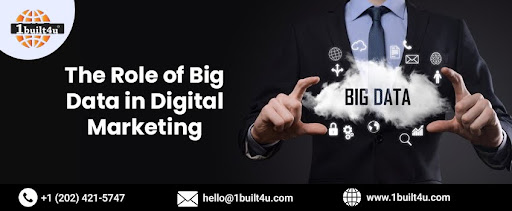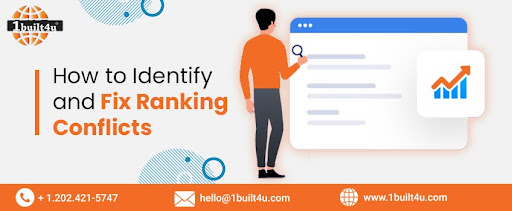
The Role of Big Data in Digital Marketing
You might have heard the name of big data here and then, and rightfully so. In the rapidly evolving landscape of digital marketing, businesses are constantly seeking innovative ways to connect with their target audience, understand consumer behavior, and optimize their marketing strategies. One of the key catalysts driving this evolution is big data. Big data, characterized by vast sets of structured and unstructured data, is transforming the way businesses approach marketing, providing unprecedented insights and opportunities for personalized and targeted campaigns. Hence, our digital marketing company brings you into the multifaceted role of big data in digital marketing, exploring its impact on customer understanding, campaign optimization, and overall business success.
Understanding Customer Behavior
At the core of any successful marketing strategy lies a deep understanding of customer behavior. Big data plays a pivotal role in this aspect by enabling marketers to gather, analyze, and interpret large volumes of data from various sources. Social media interactions, website visits, purchase history, and demographic information are just a few examples of the data points that contribute to a comprehensive customer profile.
By leveraging big data analytics tools, marketers can uncover patterns and trends that reveal valuable insights into customer preferences, behaviors, and expectations. For instance, if an e-commerce platform notices a surge in mobile app purchases during weekends, it can tailor its promotional campaigns to target mobile users specifically during those peak times. This level of granularity in understanding customer behavior allows businesses to craft highly targeted and personalized marketing messages, increasing the likelihood of engagement and conversion.
Personalization and Targeted Marketing
The era of one-size-fits-all marketing is long gone, and big data is instrumental in ushering in the age of personalized and targeted marketing. With the wealth of information available, businesses can create highly tailored campaigns that resonate with individual consumers. For example, an online clothing retailer can use past purchase data to recommend similar items or offer exclusive discounts on a customer's preferred product category.
Personalization extends beyond product recommendations to include personalized communication channels and messaging. Email marketing, for instance, can be optimized through big data analysis to send targeted messages based on customer preferences and behaviors. This not only enhances the customer experience but also increases the effectiveness of marketing efforts, leading to higher conversion rates and improved customer loyalty.
Predictive Analytics for Campaign Optimization
One of the most powerful applications of big data in digital marketing is predictive analytics. By analyzing historical data, businesses can develop models that forecast future trends and outcomes. This allows marketers to anticipate customer behavior, identify potential opportunities, and proactively optimize their marketing strategies. For instance, an online streaming service can use predictive analytics to identify content preferences and recommend personalized playlists or movie suggestions. By analyzing viewing history, search queries, and user feedback, the platform can continuously refine its recommendations, enhancing the overall user experience and increasing customer satisfaction.
Predictive analytics also plays a crucial role in optimizing advertising campaigns. Marketers can use predictive models to forecast the performance of different ad creatives, channels, and targeting strategies. This data-driven approach enables businesses to allocate resources more effectively, ensuring that marketing budgets are invested in strategies with the highest likelihood of success.
Real-Time Decision-Making
In the fast-paced world of digital marketing, the ability to make real-time decisions is a competitive advantage. Big data facilitates real-time analytics, allowing businesses to respond promptly to changing market conditions and consumer behaviors. For example, if a social media campaign is not generating the expected engagement, marketers can quickly analyze real-time data to identify the issue and adjust their strategy accordingly.
Real-time decision-making is particularly crucial in dynamic environments such as social media, where trends can emerge and fade in a matter of hours. By monitoring social media platforms in real-time, businesses can identify trending topics, capitalize on viral content, and engage with their audience at the right moment. This agility in response is a key factor in staying relevant and maintaining a competitive edge in the digital landscape.
Customer Journey Mapping
Understanding the customer journey is essential for creating a seamless and cohesive experience across various touchpoints. Big data enables businesses to map the entire customer journey by tracking interactions across multiple channels and devices. From the initial awareness stage to the final conversion, every touchpoint contributes valuable data that can be analyzed to optimize the customer experience.
For instance, an e-commerce website can use big data to analyze the customer journey from the first website visit to the completed purchase. By identifying potential drop-off points or areas where customers frequently abandon their carts, businesses can implement targeted strategies to address these issues and improve the overall conversion rate.
Integration with Emerging Technologies
Big data's impact on digital marketing is further amplified by its integration with emerging technologies such as artificial intelligence (AI) and machine learning (ML). These technologies enhance the capabilities of big data analytics, enabling more sophisticated analysis and automation.
AI-powered algorithms can analyze vast datasets to identify hidden patterns and correlations that may not be apparent through traditional analytics. This, in turn, allows marketers to uncover deeper insights into customer behavior and preferences. Machine learning algorithms can also continuously learn and adapt, refining their predictions and recommendations over time based on evolving data.
Chatbots and virtual assistants, powered by AI, are another example of how big data is transforming customer interactions. By analyzing customer queries and interactions, these virtual assistants can provide personalized responses, recommend products or services, and even anticipate customer needs.
Challenges and Considerations
While big data presents immense opportunities for digital marketers, it also comes with its own set of challenges for any digital marketing company. Privacy concerns, data security, and the ethical use of customer data are critical considerations in the era of big data. Striking a balance between leveraging data for personalized marketing and respecting customer privacy is paramount to maintaining trust and compliance with data protection regulations.
Additionally, the sheer volume of data available can be overwhelming, making it essential for businesses to invest in robust data management and analytics infrastructure. The skills gap in data analytics and the need for specialized expertise in interpreting big data insights are challenges that organizations must address to fully harness the potential of big data in digital marketing.
Conclusion
In conclusion, the role of big data for any digital marketing agency is transformative and multifaceted. From understanding customer behavior and personalizing marketing messages to optimizing campaigns through predictive analytics, big data has become an indispensable tool for businesses seeking to thrive in the digital landscape. Real-time decision-making, customer journey mapping, and integration with emerging technologies further contribute to the evolving synergy between big data and digital marketing.
As businesses continue to navigate the dynamic landscape of digital marketing, those that effectively harness the power of big data will not only stay ahead of the curve but also build stronger connections with their target audience. The journey towards data-driven marketing is ongoing, and as technology advances, the role of big data in shaping the future of digital marketing is poised to become even more prominent. For more information or to avail our digital marketing services Ashburn USA, visit 1built4u.com .





